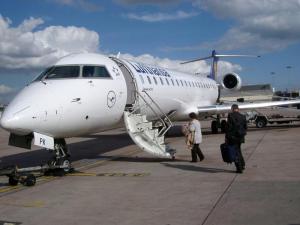Many patients with active cancer can fly safely. If you have concerns about your fitness for flying, ask your doctor — some cancer patients (such as those who have had lung-related problems, edema, or recent surgery) might be at risk for complications if they fly. Cancer Research UK’s brief list addresses situations when you shouldn’t fly. The National Comprehensive Cancer Network’s online article offers general tips about traveling with cancer. However, even though you and your doctor think you can fly safely, sometimes the airline might prevent you from flying … continue reading
Home » Lung Cancer » Can I fly when I have cancer?



Plus, be more aware of DVT (deep vein thrombosis) risks from sitting so long. Be sure to get up and walk up and back down the aisle at least once an hour to pump those legs.
LikeLike
Thanks for the information!
LikeLike
I spent many years working in the air for two commercial airlines after taking a break from the long hours of the corporate world. Although true an airline has a liability and can restrict access, denying boarding is the last thing an airline wants to engage in. Discrimination becomes the issue and employees are not able to make those assessments because they are not licensed medical professionals.
As a result, should you exhibit or express physical limitations prior to the flight, the procedure would be to contact medical professionals for an evaluation. All airlines now are contracted with major emergency facilities 24/7 both on the ground and in the air. On the ground, EMT’s are also available.
Denying boarding is not typical and is for extreme cases such as appearing contagious with fever or being under the influence. An evaluation would be triggered if a passenger requests special accommodation and their needs would disrupt flight procedures or safety. Not having enough battery power in a concentrator and stating it is medically necessary during the flight would trigger an evaluation. These evaluations generally include the Pilot in Command, Flight Ops and other departments. These decisions are not made frivolously. More importantly the passenger has usually made statements that has lead everybody to believe their well being would be compromised. And, on the other hand, if a passenger says they are fine, and there is no objective evidence they are not, they need to go. So these stories are more complex than they appear.
So my suggestion would be to make sure you have a medical release to fly and you are able to handle the different phases of flight without assistance. A major consideration that goes unrecognized is pressurization. The cabin is pressurized at 8,000 feet approximately 20 minutes after takeoff. This change in altitude can be difficult for people who are compromised.
Additionally, be responsible for your own well being within the airline system. Bring snacks and food. Buy water in the terminal…water may not be available until service begins during flight which is quite some time after boarding. Airlines are not able to do a ground service and individual requests may not be accommodated.
In closing, incidents do happen. Generally stories are taken out of context. Usually there are additional considerations and unpublished circumstances that result in less than favorable outcomes. In the big picture, these incidents are rare. Try to keep in mind, airlines are in the business of moving people safely. Their profit margin is slim. They want you as a guest and will work with you if they can. Just make sure your expectations are in line with their objectives.
LikeLike